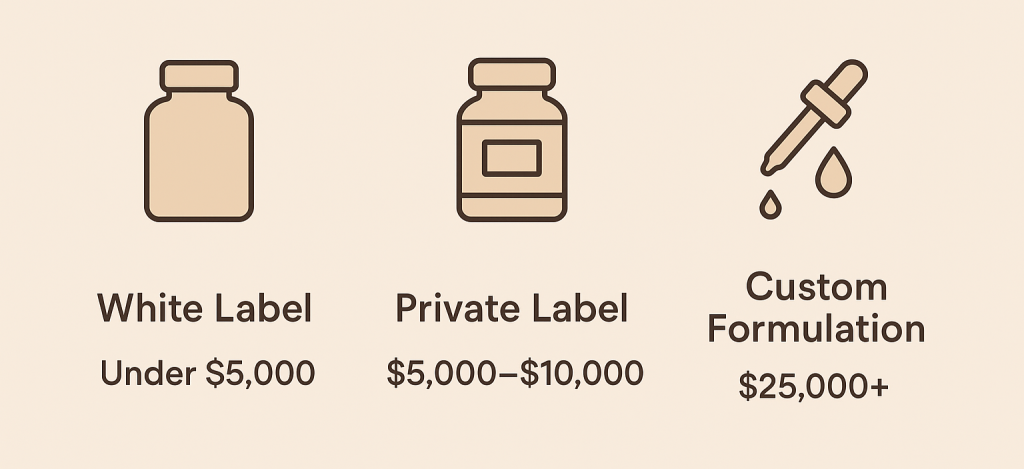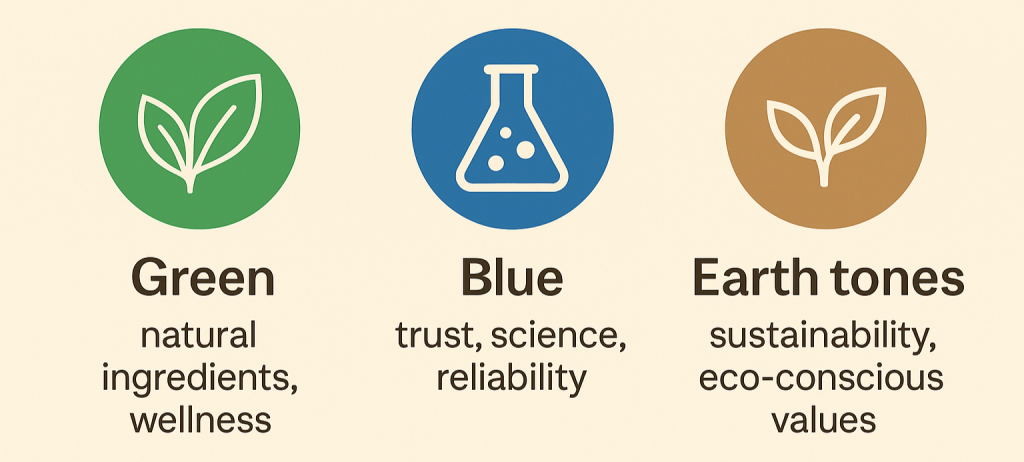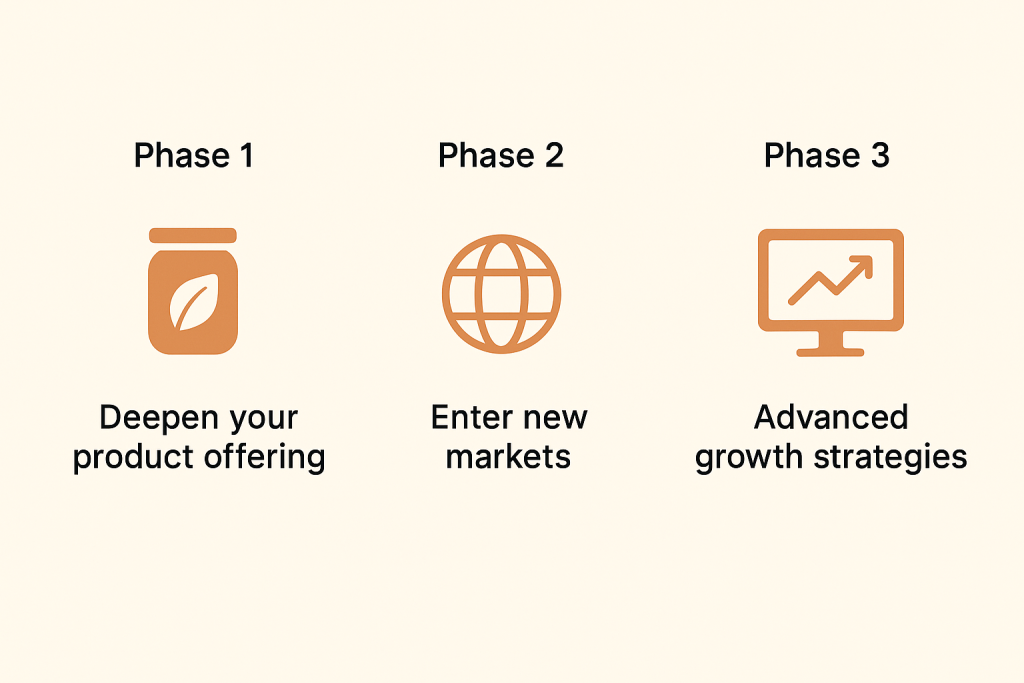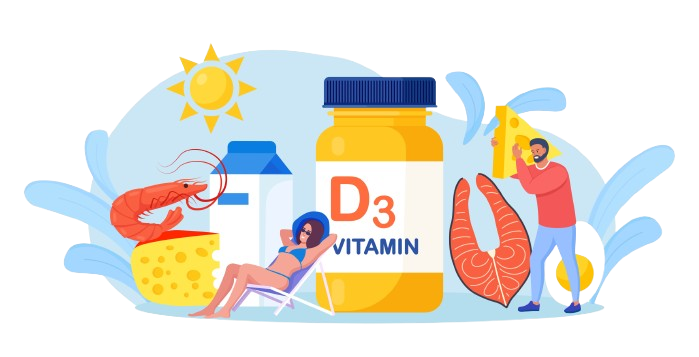The supplement industry is entering a phase of significant growth, with global market value soaring past $177 billion in 2023 and projected to exceed $230 billion by 2027. This surge offers a huge opportunity if you want to create your own supplement brand in the next few years. As health-conscious consumers continue embracing preventive healthcare, demand for nutritional supplements and sports nutrition solutions is stronger than ever.
This guide will show you how to develop your supplement brand strategically – from evaluating nutritional supplements market niches to choosing the right approach and scaling a profitable own business. Whether you’re launching private label supplements or developing a custom supplement formula, you’ll learn practical steps to build a thriving supplement brand.
Supplement Business Preparation
The supplement industry provides entrepreneurial avenues for individuals eager to establish a private label supplements business with strong margins. Now is the perfect time to launch your brand thanks to lasting demand for nutritional supplements, driven by a shift toward preventative health and wellness.
The supplement industry offers high profit margins, strong consumer demand, and room for innovation. Established companies often enjoy 40–60% gross margins, and direct-to-consumer brands can do even better by skipping wholesale markups and building direct relationships with customers. Market research indicates that supplement sales will maintain a compound annual growth rate of 7-8% through 2027, with particular strength in immune support, personalized nutrition, and plant-based formulations.
Today’s market is driven by:
- Increased focus on preventative health
- Interest in sustainable, plant-based lifestyles
- Demand for personalized, data-driven nutrition
Consumer behavior emphasizes significant growth in categories like immune support, gut health, personalized nutrition, and sports nutrition. This trend underpins opportunities for private label supplements and allows aspiring founders to get their nutrition brand with relatively accessible entry points and accelerated timelines.
If you can deliver quality, trust, and value, there’s space for your brand to grow – especially in niche markets where customers feel underserved.

Why Private Label Works?
Many private label manufacturers even offer services like packaging design, compliance support, and supplement fulfillment integration. That means less hassle and a quicker route to revenue.
Most beginners opt for private label because they offer flexibility and require smaller minimum order quantities. You can typically start with just 100–500 units. This approach reduces your risk while letting you build a recognizable brand identity.
Ready to turn your supplement idea into a thriving brand? Learn all about how to sell your supplement brand efficiently, starting from sales strategies and ending with marketing tips. Below is a step-by-step guide to help you launch your supplement business, from product development to fulfillment. Whether you’re starting solo or teaming up with experts, these practical steps will give you a clear path to follow, avoid common pitfalls, and make smarter business decisions from the get-go.
Step 1: Choose Your Business Model
Before you launch, decide how you want to source and create your products. There are three main paths:

Now, let’s consider each option in more detail.
1. White Label
- Pre-made, ready-to-ship products with generic formulas.
- Cost: Under $5,000 | Timeline: 2–4 weeks
- Pros: Fastest launch, lowest cost.
- Cons: Minimal differentiation; competitors can sell the same product.
White label products represent the fastest entry point into the supplement market, allowing you to start selling immediately with minimal upfront investment. These are ready-made supplements with generic labeling that you can rebrand and resell under your own company name.
While white label offers the lowest barrier to entry, it provides limited brand differentiation since multiple sellers may offer identical products. This approach works best for entrepreneurs who want to test market demand, learn industry dynamics, or generate initial revenue while developing more differentiated products.
The primary advantage lies in speed and simplicity. You can launch a supplement business within weeks, focusing your energy on marketing and customer acquisition rather than product development. However, long-term success requires transitioning to more differentiated offerings as your brand grows.
2. Private Label
- Existing formulas, but with your own branding, labels, and packaging.
- Cost: $5,000–$10,000 | Timeline: 1–3 months
- Pros: Moderate cost, more control, low minimum orders (often 100–500 units).
- Cons: Formulas aren’t exclusive, but can be positioned uniquely.
Private label supplements allow you to work with manufacturers who have established supplement formulas. You customize the branding, packaging, and messaging, which lets you build a strong supplement brand without starting from scratch. Thanks to low minimum order quantities, often around 100–500 units, this approach is ideal for testing the market while keeping risks manageable.
Private label supplement manufacturers typically offer low minimum order quantities, sometimes as few as 100 bottles, making this approach accessible for initial market testing. You gain access to proven formulations with established safety profiles while maintaining control over branding, pricing, and customer relationships.
The development process involves selecting from existing formulas, customizing label design and packaging, and establishing your brand identity. Most private label manufacturers provide design services and regulatory compliance support, streamlining the launch process for new supplement companies.
3. Custom Formulation
- Create your own recipe, dosages, and ingredient blend.
- Cost: $25,000+ | Timeline: 6–12 months
- Pros: Full control, high differentiation, IP protection.
- Cons: High cost, longer time to market.
Custom formulation represents the premium approach to creating your supplement company, offering complete control over ingredients, dosages, and intellectual property. This path requires substantial investment but provides maximum differentiation potential and brand protection.
The custom development process involves working with formulation chemists, conducting stability testing, and navigating regulatory approvals. Development timelines typically span 6-12 months, with costs ranging from $25,000 or more depending on complexity and required certifications.
Custom formulations make sense for established brands with proven market demand, sufficient capital reserves, and clear differentiation strategies. This approach allows for patent protection, premium pricing, and exclusive market positioning that competitors cannot easily replicate.
For entrepreneurs considering private label or custom formulation routes, working with an experienced partner in contract manufacturing of supplements like Merywood can provide tailored solutions that fit different business goals and budgets. They offer flexible private label programs for startups wanting to test the market quickly, as well as advanced custom formulation services for brands aiming to stand out with unique products.
Still unsure? Consider the following table to see the key distinctions.
| Business Model | Startup Investment | Time to Market | Product Control | Differentiation Potential |
|---|---|---|---|---|
| White Label | Under $5,000 | 2-4 weeks | Limited | Low |
| Private Label | $5,000-$10,000 | 1-3 months | Moderate | Medium |
| Custom Formulation | $25,000+ | 6-12 months | Complete | High |
Step 2: Market Research and Niche Selection
Successful supplement businesses focus on specific market segments rather than attempting to serve everyone. Effective market research identifies underserved niches with sufficient demand to support profitable businesses.
For example, vegan supplements targeting athletes or clean-label gut health products for busy professionals. The key is knowing exactly who you’re serving and what problem your products will solve.
Several supplement categories demonstrate particularly strong growth potential for new brands entering the market.
Immune support supplements
These include vitamin D, zinc, and elderberry formulations – they maintain elevated demand following increased health consciousness. Consumers actively seek products supporting immune function, creating opportunities for innovative delivery methods or synergistic ingredient combinations.
Personalized nutrition
This is a rapidly expanding niche, with brands offering customized supplement recommendations based on DNA testing, lifestyle factors, or health questionnaires. This category appeals to consumers seeking targeted solutions rather than one-size-fits-all approaches.
Vegan supplements
These types of supplements address the growing plant-based consumer segment, particularly for nutrients traditionally derived from animal sources. Algae-based omega-3s, plant-based proteins, and vitamin B12 formulations specifically designed for vegans show strong market potential.
Clean-label products
Known for emphasizing organic ingredients, minimal processing, and transparent sourcing continue gaining market share. Consumers increasingly scrutinize supplement labels, creating opportunities for brands prioritizing purity and sustainability.
Sports nutrition
This category is targeting fitness enthusiasts and athletes maintains steady growth, with particular interest in natural performance enhancers, recovery formulations, and products supporting specific training goals. If you want to enter this niche quickly without compromising on quality, consider working with an established sports nutrition private label manufacturer like Merywood to launch premium performance-focused products under your own brand.
Gut health supplements
These include probiotics, digestive enzymes, and prebiotic formulations, and benefit from growing awareness of the microbiome’s role in overall health. This category offers numerous opportunities for targeted formulations addressing specific digestive concerns.
How to Validate Your Niche?
Before committing to a product idea, test the market:
- Check Search Trends: Use Google Trends and keyword research tools to spot categories with steady or rising interest over the past 2–3 years. Look for long-tail keywords that reveal specific consumer needs (e.g., “plant-based omega-3 for runners”).
- Analyze Competitors on Amazon: Explore top-selling supplements in your category. Pay attention to pricing, reviews, and recurring customer complaints. A product with high sales but poor feedback is an opportunity for you to improve on what’s already selling.
- Leverage Industry Reports: Resources like Nutrition Business Journal provide growth rates, demographics, and emerging ingredient trends.
Target Audience Analysis
Understanding your ideal customer enables more effective product development and marketing strategies. Demographic and psychographic analysis reveals preferences that influence purchasing decisions.
- Millennials and Gen Z consumers prioritize sustainability, ingredient transparency, and brand values alignment. These demographics respond well to brands emphasizing environmental responsibility, ethical sourcing, and social activism. They’re willing to pay premium prices for products meeting their values-based criteria.
- Busy professionals seek convenience and efficiency in their supplement routines. Daily packs, subscription services, and all-in-one formulations appeal to this segment. They value evidence-based claims and appreciate brands that simplify complex health information.
- Seniors focus on scientifically-backed formulations addressing age-related health concerns. This demographic prefers established ingredients with clinical research support, particularly for joint health, cognitive function, and cardiovascular support.
- Fitness enthusiasts and athletes demand high-quality ingredients, third-party testing, and performance-focused formulations. They’re knowledgeable consumers who research ingredients thoroughly and value transparency about manufacturing processes and quality control measures.
Step 3: Finding the Right Manufacturing Partner

Selecting a contract manufacturer significantly impacts your product quality, regulatory compliance, and business success. Thorough due diligence during partner selection prevents costly problems later.
Your manufacturing partner must posses all necessary certifications and meet compliance standards. One such example could be maintaining current Good Manufacturing Practice (GMP) certification, which ensures consistent product quality and safety standards. In the United States, supplement manufacturers must comply with FDA’s 21 CFR Part 111 regulations governing dietary supplement production. Additional certifications to look for include NSF International, HACCP (Hazard Analysis Critical Control Point), BRC (British Retail Consortium), and relevant ISO standards.
International markets require specific certifications and compliance standards. European Union markets operate under the Food Supplements Directive, while Canada requires Natural Health Product regulations compliance. Choose manufacturers with experience in your target markets to avoid regulatory complications.
Key Manufacturer Selection Criteria
Choosing the right supplement manufacturer is one of the most important decisions you’ll make when building your brand. Beyond just production capacity, the best partners support your growth with flexibility, quality, and value-added services. Here’s what to look for:
- Minimum Order Quantities (MOQs): Low MOQs – ideally between 10 to 100 units – help reduce upfront costs and inventory risk. Manufacturers that specialize in supporting startups often offer more flexible ordering terms for initial product launches.
- Quality Control Processes: Consistent product quality relies on thorough raw material testing, in-process monitoring, and final batch analysis. Ask manufacturers for details on their testing protocols and whether they can provide Certificates of Analysis (COAs) for each production run.
- Product Development Support: Not all manufacturers assist with product creation. Look for partners that offer formulation support, ingredient sourcing, and help navigating regulatory compliance – especially valuable if you’re new to the industry.
- Packaging and Labeling Services: Manufacturers offering in-house packaging, design assistance, and compliance checks simplify your workflow. This eliminates the need for multiple vendors and ensures a consistent customer experience.
- Fulfillment Capabilities: Some manufacturers offer logistics services like direct-to-customer shipping or Amazon FBA prep. These can reduce your operational complexity and allow you to scale faster without needing a separate fulfillment partner.
For entrepreneurs seeking a top-tier contract manufacturing partner in Europe, Merywood stands out as a premium choice. They offer full-service solutions including custom formulation, GMP-certified production, packaging design, and fulfillment services. Their deep knowledge of European regulatory requirements ensures your supplements meet all necessary certifications, reducing risk and allowing you to focus on branding and marketing.
Step 4: Legal Requirements and Regulatory Compliance
Setting up the right legal structure protects your personal assets and gives your supplement business credibility. Most founders opt for an LLC or corporation, register with state and federal authorities, obtain an EIN, and secure product liability insurance to cover manufacturing errors, contamination, and adverse reactions—typically costing $1,000–$5,000 per year.
Even though dietary supplements don’t require FDA pre-approval, you’re responsible for safety and accurate labeling under DSHEA. Structure and function claims must be substantiated with disclaimers, while health claims need stronger scientific evidence and sometimes FDA notification. Keep a system for tracking complaints and reporting serious adverse events to stay compliant and avoid costly fines.
For startups or expanding supplement brands, partnering with an experienced contract manufacturer like Merywood can simplify compliance and legal requirements. Merywood provides GMP-certified production, packaging, and fulfillment services while ensuring products meet European and US regulatory standards, helping brands focus on growth without risking costly missteps.
International Market Considerations
Expanding to other countries requires understanding their specific regulatory frameworks. European Union markets operate under different ingredient restrictions, labeling requirements, and notification procedures compared to US standards.
Many countries require product registration or notification before market entry. These processes can take several months and often require local representation or partnerships. Plan international expansion carefully to avoid regulatory delays.
Best European countries to start your supplement brand
- Germany: Large, health-conscious market with strong trust in regulated products. Great for long-term growth.
- The Netherlands: Business-friendly, strong logistics infrastructure, ideal for EU-wide shipping.
- Poland: Lower startup costs and a growing demand for wellness products. Good for testing ideas.
- Sweden: Eco-conscious audience and high supplement usage. Great for premium positioning.
- United Kingdom: Well-established market with strong demand, but watch out for post-Brexit import rules.
Step 5: Labeling and Safety Standards
Proper labeling ensures regulatory compliance while effectively communicating product benefits to customers. Label design significantly impacts both legal compliance and sales effectiveness.
Every supplement sold in the US or EU must include:
- Supplement facts panel: All ingredients, serving sizes, and amounts per serving
- Ingredient list: In descending order by weight, using standard nutrient names
- Net quantity statement: Exact amount of product in the container
- Manufacturer details: Name, address, and contact information
- Mandatory disclaimers: Especially the FDA disclaimer, which would read along the lines of “The standard disclaimer “These statements have not been evaluated by the Food and Drug Administration” must appear prominently on structure/function claims.”
- Warnings: Allergens, contraindications, and dosage limits
Quality Control and Testing Standards
Third-party testing for purity, potency, heavy metals, and microbial contamination has become industry standard practice. While not legally required, this testing provides crucial quality assurance and customer confidence. Certificates of Analysis (COAs) document product testing results and should be available for customer review. Many successful supplement companies publish COAs on their websites, demonstrating transparency and quality commitment.
Batch record documentation tracks raw materials, production processes, and quality control measures for each production run. Maintaining detailed records supports quality investigations and regulatory compliance.
Step 6: Brand Development and Design
In a crowded supplement market, your brand is your identity. It’s what customers remember, trust, and recommend. A strong brand doesn’t just look good – it communicates quality, builds credibility, and connects with the values of your audience.
Building a Brand Identity People Remember
Your brand should speak to your audience before they even pick up the bottle.
- Choose a name that sticks: Memorable, easy to pronounce, and aligned with your market’s values. Avoid overly medical terms that could imply drug claims.
- Design a logo with purpose: Minimalist designs work well for science-driven or transparency-focused brands; intricate designs may fit luxury or heritage-style products.
Pro tip: Tap into color psychology

Packaging That Sells (and Lasts)
Your packaging should protect your product, reflect your values, and appeal to your customers’ lifestyles.
- Sustainable choices: Glass, recyclable plastics, or post-consumer materials can justify premium pricing and boost brand perception.
- Clean label design: Clear fonts, logical layout, and quick readability for key ingredients, benefits, and certifications.
- Smart features: QR codes linking to COAs, ingredient sources, or usage videos can increase transparency and customer trust.
- Ergonomic design: Packaging that fits easily into medicine cabinets, gym bags, or travel kits encourages repeat purchases.
Remember: your brand isn’t just your logo – it’s the sum of every interaction customers have with your product, from unboxing to repeat ordering.
Step 7: Financial Planning and Startup Costs
Launching a supplement brand doesn’t require millions – but it does require smart financial planning. With the right approach, your business can become profitable within 6–12 months. Below is a breakdown of the key cost areas you should plan for.
Key Startup Costs for a Supplement Brand
| Expense Category | Typical Cost (USD) | What’s Included |
|---|---|---|
| Product development | from $7,000 | Formula creation, lab samples, initial R&D, basic consulting. |
| Manufacturing & inventory | from $5,000 | First production run (usually 300–500 units), raw materials, factory setup. |
| Regulatory & legal | $1,000–$2,000 | Company registration, label compliance, insurance, essential certifications. |
| Packaging & branding | from $2,000 | Label design, packaging, brand identity development. |
| Marketing & launch | $3,000–$6,000 | Paid ads, influencer campaigns, PR outreach, and content production. |
Revenue & ROI Projections (What You Could Earn)
| Metric | Value |
|---|---|
| Units produced | 1,000 bottles |
| Selling price (per unit) | $45 |
| Total potential revenue | $45,000 |
| Production cost (per unit) | $13.50 – $22.50 |
| Gross profit (per unit) | $22.50 – $31.50 |
| Gross margin | 50–70% |
| Customer Acquisition Cost (CAC) | $20 – $40 |
| Net profit (after ads, per unit) | –$17.50 to +$11.50 |
| Average order value (AOV) | $50 – $100 |
| Break-even point | ~430–770 bottles sold |
Unlike many industries, the private label supplements market offers strong repeat purchase behavior. With good customer retention and subscription models, your second and third sales per customer come at much lower costs, drastically improving profitability over time. This is why many brands reinvest early profits into inventory and scaling ads to grow fast in the first year.
Step 8: Building Your Online Presence
Your online store serves as the primary sales channel for most supplement brands. Platform selection and website optimization significantly impact conversion rates and customer experience.
For instance, Shopify dominates supplement e-commerce due to built-in compliance features and payment processor compatibility. The platform handles many industry-specific requirements while providing flexibility for customization and growth. WooCommerce, in turn, offers more customization options for technically sophisticated brands but requires more development resources and ongoing maintenance. This platform works well for brands with unique requirements or existing WordPress ecosystems.
Custom e-commerce platforms rarely make sense for new supplement businesses due to high development costs and lengthy timelines. Focus resources on marketing and product development rather than reinventing established e-commerce functionality.
Essential Website Features
✓ Trust signals: Add testimonials, certifications, guarantees, and quality badges so visitors immediately know your products are safe and credible.
✓ Educational content: A blog, FAQs, and ingredient pages help answer questions and position your brand as an authority.
✓ Professional product photos: Use clear, high-quality images, lifestyle shots, and close-ups to make your products look irresistible.
✓ Subscription options: Offer auto-ship with discounts or free shipping to encourage repeat purchases and build loyal customers.
✓ Mobile optimization: Since over 60% of supplement purchases happen on mobile, make sure your site loads fast and works perfectly on small screens.
✓ Fast checkout: Keep checkout quick and simple, with minimal steps and multiple payment options.
Step 9: Digital Marketing Strategy
Your marketing isn’t just about selling a product – it’s about earning trust in a crowded, highly regulated market. The most successful brands don’t rely on one single tactic; they combine multiple channels to build awareness, attract new customers, and keep them coming back.
To keep things simple, think of your marketing in three core pillars: Be Found, Be Seen, Be Remembered. Each pillar plays a different role in guiding customers from first discovery to repeat purchases.

Pillar 1: Be Found (Search & Content)
You can have the best supplement in the world, but if people can’t find it, you won’t make a single sale. This is where search engine optimization (SEO) and educational content come in. Here are a few things to keep in mind:
- SEO: Focus on long-tail keywords tied to specific health needs, ingredient benefits, or supplement comparisons. This makes it easier to rank for searches with strong buying intent.
- Content marketing: Build authority by publishing guides, ingredient spotlights, and clear answers to customer questions. This attracts both organic traffic and credibility.
- Local SEO: If you plan to work with local distributors or healthcare professionals, optimize for location-based searches and make sure your Name, Address, and Phone (NAP) details are consistent everywhere.
Pillar 2: Be Seen (Social Media & Influence)
This is where you put a face (and personality) to your brand. Social platforms allow you to connect with customers on a personal level and show the values behind your products. Remember the following:
- Social platforms: Use Instagram and TikTok to share customer success stories, behind-the-scenes production, and health tips that fit your niche.
- Influencer partnerships: Work with micro-influencers who have engaged communities. Their recommendations often feel more authentic than big celebrity endorsements.
- User-generated content: Invite customers to share transformation stories, product photos, or recipes. Reward them with discounts, giveaways, or brand features to keep the cycle going.
Pillar 3: Be Remembered (Advertising & Retention)
Once someone finds you, you need to stay on their radar, and give them reasons to keep buying. Here’s how:
- Remarketing: Target past visitors and previous buyers with personalized campaigns that highlight complementary products or subscription offers.
- Paid ads: Use compliant ad creative that focuses on lifestyle benefits, product quality, and wellness support. Avoid exaggerated medical claims to stay within platform rules.
- Email marketing: Create automated sequences to welcome new customers, share educational content, and make special offers. Supplements are often repeat purchases, so a strong email strategy boosts lifetime value.
Step 10: Scaling Your Supplement Business
Scaling a supplement brand is all about expanding strategically, protecting quality, and keeping customers loyal while you grow.
Many brands fail by trying to do everything at once, which can lead to cash flow problems, supply chain breakdowns, or a loss of product integrity.
The smartest approach is to grow in three clear phases, each building on the last.
By moving through these stages in order, you can deepen your customer relationships, expand your reach, and unlock higher-value growth opportunities without losing control of your brand.

Phase 1: Deepen Your Product Offering
Your existing customer base is your most valuable asset, so the first step is to give them more reasons to buy from you.
- Product extensions: Build on your flagship products with related formulas that solve connected health needs. For example, if you sell an immune booster, consider adding a stress support or sleep aid for year-round wellness.
- Bundles & kits: Combine products into themed packages such as “Daily Wellness,” “Fitness Support,” or “Immune Defense” to increase average order value and make purchasing easier for customers.
- Seasonal launches: Release time-sensitive products that align with predictable demand. For instance, immune support products sell well in fall and winter, while weight loss supplements and energy products peak in January and spring
Phase 2: Enter New Markets
Once you’ve maximized your current audience, it’s time to bring your products to new customers.
- International expansion: Research local regulations, ingredient restrictions, and labeling requirements before entering foreign markets.
- Local partnerships: Work with distributors or consultants who know the market and can guide you through compliance and cultural expectations.
- Cultural adaptation: Don’t just translate your labels; adapt flavors, packaging sizes, and marketing messages to resonate with local buying habits.
Phase 3: Advanced Growth Strategies
With a stable product base and established markets, you can now explore high-leverage strategies that accelerate growth.
- Wholesale & partnerships: Supply products to gyms, health stores, and wellness clinics to broaden your reach beyond direct-to-consumer sales.
- Licensing: License your proprietary formulas to other brands for passive revenue without additional manufacturing costs.
- Acquisitions: Acquire smaller or complementary brands to quickly expand your product portfolio, access new markets, or strengthen your supply chain.
Common mistakes to avoid
Learning from common industry mistakes saves time, money, and reputation damage. New supplement entrepreneurs frequently encounter predictable challenges that proper planning can prevent.
Investing heavily in custom formulations too early
Many new supplement entrepreneurs spend thousands on custom products before knowing if there’s market demand. This often results in excess inventory that doesn’t sell. A safer approach is to start with private label or white label options to test the market first.
Launching multiple products at once
Trying to promote several products simultaneously can stretch limited marketing resources and dilute your brand’s impact. Focusing on one flagship product allows you to perfect your launch and build a loyal customer base before scaling.
Choosing manufacturers based solely on price
While cost savings are tempting, cheap manufacturing often leads to quality issues, regulatory risks, and unreliable supply. Partnering with reputable manufacturers—even if slightly more expensive—protects your brand’s reputation and ensures consistent product quality.
Underestimating digital marketing costs
New supplement brands often miscalculate how much it will cost to acquire customers online. Overspending or poor optimization can quickly drain profits. Planning budgets carefully and tracking marketing ROI is crucial for sustainable growth.
Neglecting customer service and retention
Acquiring new customers is important, but retaining them is often more profitable. Poor customer support or slow responses can lead to lost repeat business. Developing systems to manage inquiries and maintain relationships ensures long-term success.
Final Thoughts
Building your supplement brand isn’t just about jumping on a trend – it’s about strategically leveraging market shifts, modern consumer values, and lean business models like private label.
Whether you start with low minimum order quantities or plan for custom formulations later, the most important step is starting now – before your niche becomes saturated. With smart planning and the right contract manufacturer, your brand can carve out a lasting space in the global health market. Merywood offers a streamlined, expert-driven approach to help startups and growing brands succeed in the competitive European market. Whether you’re starting lean with private label supplements or aiming for custom formulations, Merywood can be your trusted partner.




 Community
Community
